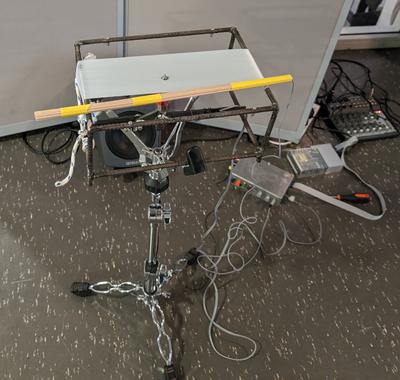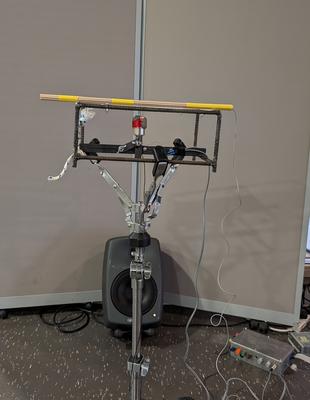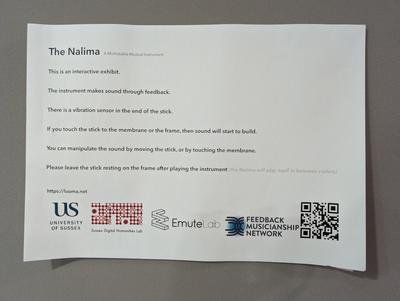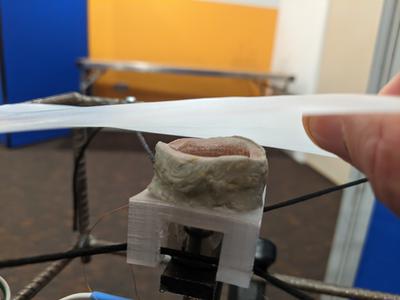New Luuma release: Ffroeds
A new Luuma release comes out on November 15th 2024: Ffroeds, on the Flaming Pines label.
It's available on Bandcamp: https://flamingpines.bandcamp.com/album/ffroeds
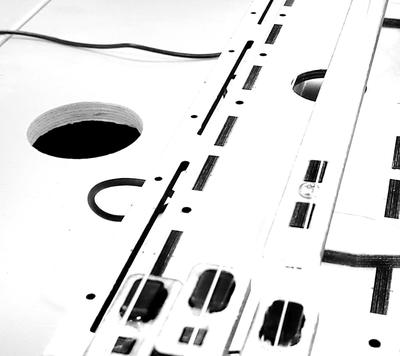
Composed primarily using Chris Kiefer's own invented feedback instruments Ffroeds offers a version of music which emerges from a collaboration with these unruly and unpredictable devices.
Feedback instruments are self-resonating, and the vibrations this causes in the devices themselves lead to strange and sometimes uncontrollable outcomes.
It is this realm between control and chaos which Kiefer, releasing under the name of Luuma, is intent on exploring using his strange and rebellious devices. Across five compositions derived from playing membrane-based, and stringed feedback instruments controlled by joysticks, patches and AI learning Kiefer's work offers a uniquely playful and rather messy take on hi-tech instruments.
"With feedback instruments, they have their own complex behaviours and we can only influence or guide them. They have their own personalities – they can be cantankerous and difficult to play, but also joyful and thrilling," he explains.
In Ffroeds Kiefer places us as listeners firmly in this world of exuberant, and sometimes bad-tempered technologies, and in doing so suggests new ways to share compositional outcomes with an instrument.
I'm going to write some posts about how each individual track was made, starting off now with the first track Nalimass.
Nalimass was made with source material from an instrument I designed, the Nalima. Like all the other instruments used for Ffroeds, it's a feedback instrument (or you could also call it a multistable instrument). The Nalima uses feedback to resonate itself with it's own sound, which can lead to some strange, wonderful and unpredicatable sounds. It's a membrane based instrument; the membrane is stretched PTFE plastic, and there's a custom built transducer that feeds acoustic vibrations into the membrane so it acts a bit like a speaker. The instrument has a drum stick/probe with a contact microphone embedded in the tip. This microphone picks up sound from the membrane, sends it through a box of digital effects, and then through an amplifier into the membrane. This feedback loop creates sound, which changes depending on lots of different factors: the pressure and position of the stick on the membrane, the digital effects, the way which you manipulate the membrane with your other hand, and also whatever was happening in the recent past in the instrument. As you might imagine, this is a complex cocktail, which make the instrument very different from conventional instruments.
To make Nalimass, I did a long recording session with the Nalima. It was early days of exploring the instrument, and I was still trying to get a feel for what it did. I started editing this recording down, to see how it could fit into a piece, but I felt like I wanted to take it a bit further and try something I'd been keen to experiment with: the concatenative synthesiser in FluCoMa. FluCoMa is an amazing library for Max and SuperCollider with all sorts of options for audio synthesis, manipulation and machine listening. It was a great system for concatenative synthesis. This works by taking a database (corpus) of audio, splitting it up into small chucks and then organising it according to some sort of quality (e.g. texture, timing, pitch etc), which gets mapped into a 2D space, with similar sounds close to each other. You can then navigate around this space, and replay the chunks according to how they are organised. I made a corpus from the Nalimass recording, and set up a patch in SuperCollider that would navigate and play sound from around the space, with the navigation controlled algorithmically by audio qualities of the sound in the past new seconds - another feedback system! Just to make things a little more fun, I added in a bunch of dirt and distortion from outboard in the studio and from our mixing desk, and then made a new recording of this feedback system. The system sort of played itself, but I manipulated it live through the mixing desk and outboard. The track is an edited down version of this recording. So there it is - a feedback instrument, used to make a feedback synthesiser, within an analogue electronic feedback loop! Layers within and across layers, rendered out into a static piece of music.

